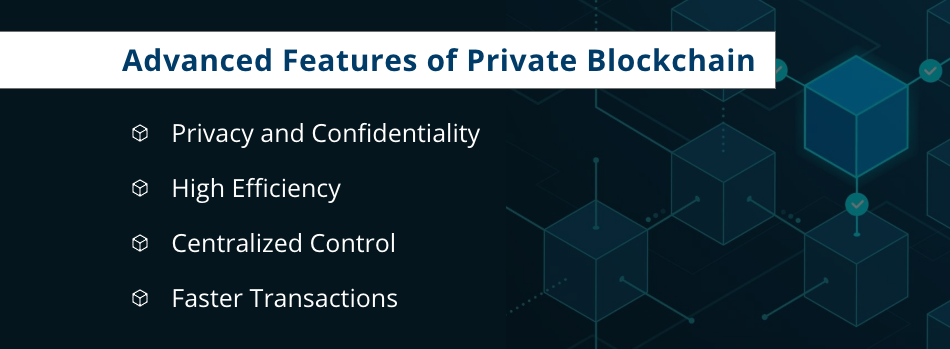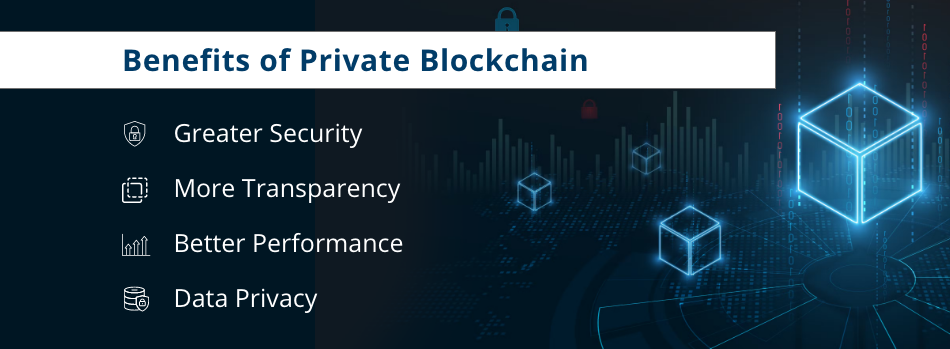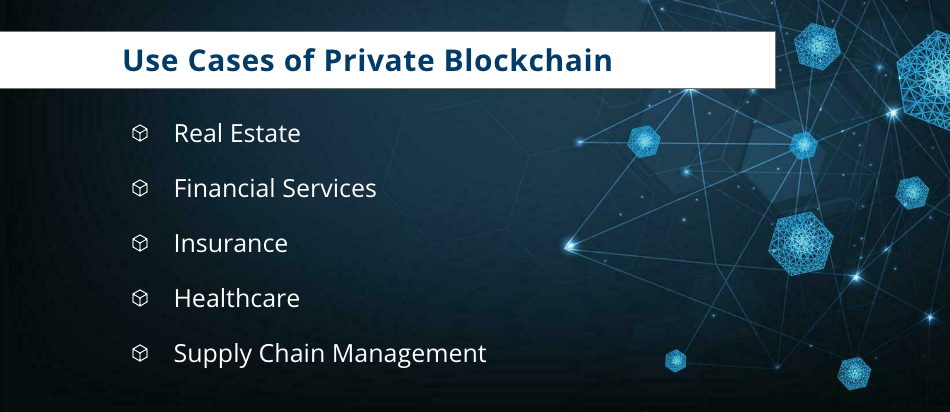Private blockchain represents a transformative force in business operations, further offering enhanced security, efficiency, and transparency.
Updated 1 April 2024

CTO at Appventurez
Blockchain technology has gone through a rapid evolution in its functionalities as well as applications, resulting in increased demand in various areas. Organizations are also increasingly exploring blockchain applications and how the technology can help in solving advanced business problems.
Even though public blockchains offer many advantages, they are more susceptible to malicious users as they are on a shared network. On the other hand, private blockchains provide additional security to the stored data, making it a driving factor for many choosing to develop this network.
In this comprehensive blog, we will understand the private blockchain application development services in business, the key differences between public and private blockchain, and the steps to develop a private blockchain to enhance security.
Blockchain is a distributed ledger technology for maintaining transparency and immutable records of digital assets. The emerging technology has drawn lots of attention as it can efficiently reduce fraud and risks. According to the reports, the overall market size of blockchain technology is expected to reach $94 billion by 2027.
Blockchain technology is primarily divided into two categories- public and private. A private blockchain is a decentralized ledger that is only accessible to a selected group of individuals or organizations. These are similar to public blockchains but are managed centrally.
It has a single operator or entity that controls who can access the network, view information, and create data on the blockchain. To gain access to this network, the individuals must receive an invitation and verify their identity.
Before diving further to understand this network, let’s understand the key differences between the two major types of blockchains.
| Factors | Public Blockchain | Private Blockchain |
|---|---|---|
| Accessibility | Anyone is free to join and participate in the blockchain network’s core activities, including reading, writing, adding blocks, and auditing the network’s activity. | Only the selected and verified participants are allowed to join the network. |
| Control | Decentralized and managed by a community of users with no single point of control. Once the blocks are validated, entries can’t be edited or deleted. | Centralized and controlled by a single entity or organization. The operator has the right to override, edit, or delete the entries on the blockchain. |
| Transparency | Facilitates transparency as all the transactions are visible to anyone on the network. | Private, as only authorized users can view the data and transactions on the network. |
| Anonymity | Users operating public blockchains can remain anonymous. | The identities of the people involved in the transaction are known. |
| Data Visibility | All transactions are visible on the network. | Access to the network is restricted and controlled. |
| Security | Highly secure and resistant to attacks, because of the decentralized nature of the network and use of cryptography. | Secured with the use of cryptography. |
Let’s go through the process of creating a private blockchain platform.

Knowing the purpose of creating a network for your business can help you strategize your plans to achieve your business goals.
It is important to identify your target audience and understand what features and functionalities should be added to the network to make it worthwhile for the consumers. Analyzing your goals before developing a private blockchain will also help you determine the blockchain app development cost.
Hire blockchain developers to build your platform, starting from scratch. It is without any doubt that creating a private blockchain requires advanced skills that only blockchain developers can have.
While hiring the blockchain developers, you can check whether they can:
Find in detail the process of building a private blockchain:
In this, the developers will use the Ethereum blockchain using the GO Ethereum. They will install Geth to verify if they want to use the Homestead version of Ethereum or other Ethereum improvement proposals. The developers can create Genesis files and modify them using the Geth console.
A skilled developer will be able to handle this task and understand the process of building a private blockchain.
In this process, you will decide the speed of your network. You can set the 0 difficulty level for the block generation. In the next step, pre-locate addresses on your chain with fake Ether balances. The reason for calling Ether fake is that you cannot transit without using the main Ethereum network.
The users’ accounts will act like crypto wallets where the participants can transact on the network. For example, users can make payments in the crypto to access services and products available on the network.
This process involves distributing Ether among the participants on the basis of the business model that the company has implemented in its network. The network will immediately start Ether mining, where the node will do all the calculations while adding new blockchain nodes.
You can assume nodes as servers that are running on the networks or EVM. There will be a requirement of enough nodes for participants to execute their equal rights over the product. Moreover, there is also a possibility that the blockchain developers will offer cloud services for running your network.
It is another scenario where the developers will talk about copying the blockchain to create forks.
This approach will offer you more control over how your chain will operate. Moreover, when using the Ethereum blockchain, you must also remove all the available decentralized apps that you don’t need for your network to avoid the resources and maintenance costs.
Creating your own private blockchain platform will not be enough and you will also need apps to fulfill your business needs. On the blockchain platform, you can create apps to enable crypto transactions, store data records, and for other different purposes.
Two essential components that are significant to creating dApps on your network are:
Instead of directly jumping on creating your network, you can build a prototype to check all your network features and UI functionalities. The prototype will help you understand how the private blockchain platform will look after its launch.
In the backend development part, there will be features, APIs, and other functionalities that will make your network fully functional. When working on the backend development part, you can decide on:
Once the dApps are ready, you can deploy their smart contracts and the rest of the required app components to your network. You should also make sure that the private blockchain developers are properly following the Agile development methodology to help you stay updated with your project, further enabling you for the app’s maintenance and upgrades after its launch.
To make your own blockchain, it is important to ensure the successful implementation and operation of private blockchain services, it is important to implement industry best practices for an efficient and secure platform.
Self-executing smart contracts can be implemented while developing this network to automate the execution of the agreements, and to provide security and integrity for the transactions.
While building your own blockchain, It is important to establish a strong network infrastructure that can handle the potential disruptions. This includes the implementation of a well-defined recovery plan, conducting regular backups, and having protocols to address possible attacks.
While understanding the pillars of blockchain technology, it is important to note that while creating a personal blockchain, one of the sought-after practices is to use a permissioned network. Enhancing security and scalability, and ensuring that only authorized people with the proper credentials can participate in the network is crucial.
To safeguard the private blockchain platforms against attackers, it is important to use strong encryption techniques for the data in transit and at rest. Additionally, you should also adhere to the secured key management protocols.
It is important to maintain legal compliance to create your own blockchain network as it is vital to adhere to the associated laws and regulations, including anti-money laundering and know-your-customer (KYC) requirements.
There is no doubt that this network helps in securing the company’s essential data and information. However, what makes it advanced are its features that help increase its efficiency. Some of the essential features are listed below:

The network provides high efficiency and works better than the public blockchain. In private blockchain, only the pre-authorized nodes get an entry, hence they can only take up fewer resources than usual. In a public blockchain, there are no limits to the number of nodes that can enter the platform.
Private blockchains are often used in situations where data privacy and confidentiality are extremely important. In this case, participants may not want their data or transactions to be visible to the public.
Due to their controlled nature, private blockchains can process transactions more quickly than public blockchains. Developers can follow the latest blockchain trends to incorporate the latest technologies while developing the network that facilitates faster transactions.
A private blockchain is often more centralized in terms of decision-making and governance. A central authority or a consortium of trusted parties typically manages and maintains the network.
The advanced tech stack required for the development of private blockchain is mentioned in the table below:
| Tech Stack | Purpose |
|---|---|
| Go Ethereum (Geth) | For implementing the chain. |
| Solidity (programming language) | For creating smart contracts |
| Remix | Creating an environment for smart contract |
| Truffle Suite | For testing blockchain |
| Infura | For deploying nodes |
| Web3.js | For connecting the chain with off-chain software |
| Node.js, React | For developing off-chain components |
There are several advantages for businesses choosing this network for their organization. Some of the important benefits are:

It brings more transparency to businesses by offering better coordination and verification between the companies and the members participating in the particular network.
By opting for private blockchain for business, organizations can restrict their networks to verified users and staff to improve their security. Moreover, the companies can also get exact details about all the participants involved in their network and take quick action in case they catch any malicious activity.
A private blockchain network consists of fewer members than a public network resulting in limited activities such as transactions and verifications, Moreover, all the transactions are also motivated with smart contracts, further helping companies to get fast performance for business-related transactions.
As a company’s network consists of authorized users, companies can also ensure that their data is secure and shared only among trusted sources.
Private blockchain has become a powerful tool for businesses seeking secure and efficient data management. The below-mentioned private blockchain use cases further explain how blockchain development can provide customized solutions:

The integration of this network into financial services, such as blockchain in banking has altered the landscape of the industry. This network in financial services helps streamline cross-border payments, expedite the settlement process, and ensure secured data sharing among financial institutions.
Real estate is another one of the private blockchain examples where the network enhances property transaction transparency and also streamlines transfers that can mitigate fraud and ensure efficient property management.
The incorporation of private blockchain in healthcare plays a crucial role in the secured sharing of patient data, thereby improving the interoperability, and ensuring compliance with data privacy regulations.
In the insurance sector, private blockchain facilitates automated claims processing, further improving data accuracy and fraud detection.
Private blockchain in supply chain management has revolutionized the operations of businesses. The network provides a secure and transparent platform that ensures the traceability of goods and reduces instances of fraud and counterfeit products.
Private blockchain holds immense potential as it offers robust, scalable, and highly secure database services to various organizations. The network also provides clear visibility into the business operations, thus reducing waste and identifying defects.
Appventurez, as a private blockchain development company, has a team of developers and specialists who can help you embark on a transformative journey toward establishing a secure and efficient decentralized infrastructure.
By leveraging cutting-edge technologies and best practices, we help empower organizations to customize and implement blockchain solutions tailored to their unique requirements. Our team will also guide you in strategizing a private blockchain network that will be capable of enhancing transparency and maintaining data integrity.
Q. How to create a blockchain?
To create a blockchain, you need to follow the mentioned steps- analyze the industry for app development, do competitor research, choose a platform for your blockchain project, design your blockchain app, start the development and the testing process, and maintenance and support.
Q. Are private blockchains more efficient than the public blockchains?
Yes. With fewer participants, transactions in the private blockchain are often more streamlined and efficient.
Q. How much does it cost to build a private blockchain?
The price of creating a private blockchain might differ based on the needs of the projects. The average cost of creating a private blockchain can be between $10,000 to $1,00,000, while a more complicated application can cost up to $2,50,000.
Q. Who uses a private blockchain network?
Private blockchains are often used by business organizations, and government agencies to implement secure and transparent record-keeping systems. A private blockchain can also provide added security to sensitive information and allow for greater control over who has access to the data on the network.


Elevate your journey and empower your choices with our insightful guidance.

CTO at Appventurez
CTO and Co-Founder at Appventurez, Sitaram Sharma has 10+ years of experience in providing world-class digital solutions. As a CTO, he brought his expertise ranging from product enhancements to advanced technological integrations, while focusing on the consistent growth of the team.
You’re just one step away from turning your idea into a global product.
Everything begins with a simple conversation.